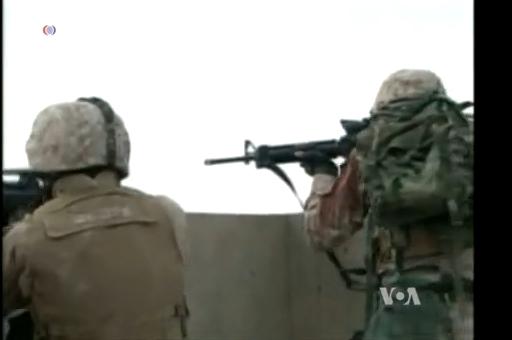参考译文
Scientists have been studying the effect of explosions on soldiers' brains since World War I.Some military veterans who survived powerful explosions may become violent or experience depression. It may be difficult for the former soldiers to concentrate on what they are doing. Their feelings may change quickly -- from happy to sad or even angry.
第一次世界大战以来,科学家们一直在研究爆炸对士兵大脑所产生的影响。一些在巨大爆炸中幸存的老兵可能会变得暴力或患抑郁症。对那些退役士兵而言,让他们专注于自己正在做什么是非常困难的。他们的情绪可能会迅速改变——从快乐到悲伤,甚至变得愤怒。
 |
|
Explosions Change Soldiers' Brains, Study Says |
Now, researchers have found that the soldiers'brains suffered physical damage, like people who die in transportation accidents or from a drug overdose.
现今,研究人员发现,那些大脑遭受物理性损伤的士兵,其大脑与在交通事故中死亡或因服药过量而死亡人们的大脑非常相似。
Researchers at the Johns Hopkins School of Medicine examined the brains of former soldiers who had died. These veterans had been injured in a battlefield explosion, but it was not what caused their death.
约翰·霍普金斯大学医学院的研究人员对那些已经死亡退役士兵的大脑进行检查。这些老兵曾经在战场上爆炸中受伤,但这并不是导致他们死亡的原因。
The researchers discovered evidence that nerve fibers in the front of the brain had been damaged. Professor Vassili Koliatsos led the study. He says the discovery explains why the veterans had a condition known as ‘shell shock.'
研究人员发现的证据表明,他们大脑前部的神经纤维受到损害。Vassili Koliatsos教授领导了这项研究。他表示,研究发现解释了为什么这些老兵会患有所谓的“炮弹休克”症状。
"And that's very important because this is the site – this is the center of the executive functions of the brain, functions that allow you to put your life together, organize, plan ahead, understand, abstract. And you can imagine that this can make your life difficult." Visit the website www.chinavoa.com to get more information!
“这是非常重要的,因为这个部位——是大脑执行功能的中心部位,让你可以生活下去,进行规划、未雨绸缪、理解事物、处理思想,并且,你能想象到这会使你的生活变得困难。
Professor Koliatsos says the physical damage was often found near blood vessels inside theskull. He says this suggests that the force of the explosion pushed blood from the chest into the brain. This caused the brain to quickly swell or become enlarged. He says when the brain swells, it pushes against the skull.
Koliatsos教授说,物理损坏通常发生在颅内血管的附近。他说,这表明,爆炸的力量将血液从胸口推向大脑,从而导致大脑迅速膨胀或变大,当大脑膨胀,就会对头骨施加推力。
The professor says that, as a result of the study's findings, doctors may decide to give different medicines to veterans suffering from post-traumatic stress disorder. And he says the findings may cause military officials to find ways to better-protect a soldier's chest.
教授还表示,作为研究的调查结果,医生可能会决定给那些患有创伤后应激障碍的老兵服用不同的药物。他还表示,这一发现可能会促使军事官员设法更好地保护士兵的胸膛。
I'm Bob Doughty.
VOA's George Putic reported on this story from Washington. Christopher Jones-Cruise adapted it for Learning English. George Grow was the editor.
_____________________________________________________________
Words in This Story
concentrate– v. to think about something; to give your attention to the thing you are doing or reading
overdose– n. an amount of a drug or medicine that is too much and usually dangerous
executive functions – n. also known as cognitive control; the management memory, reasoning, task flexibility and problem solving, as well as planning and execution.
abstract– v. to deal with general ideas or qualities rather than specific people, objects or actions
skull– n. the bony structure that forms the head
swell– v. to become larger than normal; to enlarge
听力原文
Scientists have been studying the effect of explosions on soldiers' brains since World War I. Some military veterans who survived powerful explosions may become violent or experience depression. It may be difficult for the former soldiers to concentrate on what they are doing. Their feelings may change quickly -- from happy to sad or even angry.
Now, researchers have found that the soldiers' brains suffered physical damage, like people who die in transportation accidents or from a drug overdose.
Researchers at the Johns Hopkins School of Medicine examined the brains of former soldiers who had died. These veterans had been injured in a battlefield explosion, but it was not what caused their death.
The researchers discovered evidence that nerve fibers in the front of the brain had been damaged. Professor Vassili Koliatsos led the study. He says the discovery explains why the veterans had a condition known as ‘shell shock.'
"And that's very important because this is the site – this is the center of the executive functions of the brain, functions that allow you to put your life together, organize, plan ahead, understand, abstract. And you can imagine that this can make your life difficult." Visit the website www.chinavoa.com to get more information!
Professor Koliatsos says the physical damage was often found near blood vessels inside theskull. He says this suggests that the force of the explosion pushed blood from the chest into the brain. This caused the brain to quickly swell or become enlarged. He says when the brain swells, it pushes against the skull.
The professor says that, as a result of the study's findings, doctors may decide to give different medicines to veterans suffering from post-traumatic stress disorder. And he says the findings may cause military officials to find ways to better-protect a soldier's chest.
I'm Bob Doughty.
VOA's George Putic reported on this story from Washington. Christopher Jones-Cruise adapted it for Learning English. George Grow was the editor.
_____________________________________________________________
Words in This Story
concentrate– v. to think about something; to give your attention to the thing you are doing or reading
overdose– n. an amount of a drug or medicine that is too much and usually dangerous
executive functions – n. also known as cognitive control; the management memory, reasoning, task flexibility and problem solving, as well as planning and execution.
abstract– v. to deal with general ideas or qualities rather than specific people, objects or actions
skull– n. the bony structure that forms the head
swell– v. to become larger than normal; to enlarge







